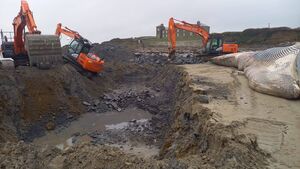Huge whale is buried on Mayo beach

The scene at Ross Beach in Killala on Friday as the large whale, which washed ashore last month, was buried.
A large fin whale, measuring 20.7 metres, which washed up on a North Mayo beach last month, has been buried.
The dead whale became stranded on the shore at Ross Beach, Killala on the weekend of January 20/21, just before Storm Isha struck. Its arrival presented a major headache for Mayo County Council, which was charged with disposing of the enormous mammal.
Head of the Ballina Municipal District Declan Turnbull said a lot of work went into preparing for the burial of the whale yesterday (Friday).
“We had to wait for the tide to go out and then the hole was dug. We consulted widely with experts from the Irish Whale and Dolphin Group (IWDG) and a lot of different agencies. The best advice was to dig a large hole on the beach and bury the whale,” he said.
“The important thing was to ensure the whale was punctured before he was buried because if it is buried with gas internally, he could reappear in future. The whale was checked and they’re happy it is in a fit state to be buried.”
An analysis was conducted by volunteers from the IWDG Stranding Scheme after the whale washed ashore and samples were taken. A post-mortem was due to be carried out but did not go ahead because of weather conditions. Coordinator of the IWDG’s Live Stranding Network Gemma O’Connor said it was likely the whale died of starvation.
“It was so skinny and emaciated, we could tell that it hadn’t been feeding. We don’t know what caused it to stop eating but it could be because of a physical injury or a disease,” she said.
“It is a massive undertaking for a local authority when a whale washes up on the shoreline and everyone faces the same dilemma. When it lands on your doorstep, it is hard to know what to do.”
She said the population of large fin whales is still recovering after being decimated by decades of whaling. Ms O’Connor said samples taken from this whale will have benefits for research.
“The skin samples will be stored in the Natural History Museum and can be used to compare fin whales from this region with other fin whales around the world.”
Members of the public who come across a whale or other mammal stranded on or close to the shoreline are asked to report it via www.iwdg.ie. In the case of a stranded animal being alive, the public is asked to call the Live Stranding Hotline on 097-28118.





